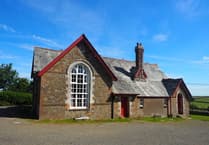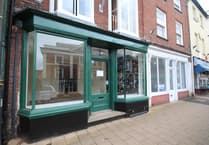ON Tuesday, May 8, after Victory in Europe was declared early in the morning, Colebrooke Sports Committee, sadly no longer in existence, swiftly organised a day of sports and a tea for the children.
No doubt with hostilities gradually coming to an end there had been meetings prior to this to make arrangements for the big day when it arrived.
The Committee was originally formed during the 19th Century for the purpose of running the annual Colebrooke Revel sports and other celebrations. It consisted mainly of local farmers and tradesmen.
The 1945 committee would have included Mr Courtney Thorne of Penstone, Mr Wilfed Dart of North Down, Mr Frank Stoneman of Bolts, Mr Albert Enderson of Browns, Mr Jim Drew of Buttisfar, Mr Charlie Cann of Gribbles and Mr Fred Keen of Coleford.
They would have had at their disposal a large array of bunting and flags with which to decorate the village and sports field, including one very large banner which used to hang from the arms of the lamp post with the words “God save the King”. This had apparently been purchased for King Edward VII coronation! They could also call upon a large collection of items such as egg and spoons, sacks etc for the various races.
The sports took place in a field belonging to Mr Stoneman of Bolts, known as Drymoor, which is opposite Bolts Farm main entrance. They began with the various children’s races progressing through to more “grown up” races such as single men and women, married men and their wives, etc and a slow bicycle race.
The finale was a married men v single men football match. The referee for this event who caused immense amusement was Fred Keen.
Fred, a painter and decorator, lived at what is now Burnhills, Coleford. Fred, quite a tall man, wore a knee length black ladies dress with a large wooden hoop sewn into the hem giving him the appearance not unlike that of the Padstow "obby ’oss".
Mr Stoneman had provided a small barrel of cider at one side of the field for players refreshment, which was sampled by players and spectators alike. (At that time most farmers made their own cider - considerable quantities being consumed at harvest time, and for farm workers, a regular “entitlement” at other times of the year. My father would budget for about eight hogsheads (hogshead = 54 gallons) a year from our orchards for farm workers and general use).
While the football match was taking place, the children began to gather at the New Inn where the landlady Miss Mabel Lee had opened what was known as “The Big Room”.
Here the ladies of the village had miraculously provided a bumper tea for the children with bottles of “pop” provided by Miss Lee. (The Big Room was a large room upstairs in the New Inn which had been used in the past for the annual “rent audits” of the large estate owners. It was converted many years ago into extra living accommodation).
Meanwhile Fred Keen had been busy on another project.
He had made a full size replica of Hitler which he tied to the bridge outside the New Inn. Around its neck was a notice referring to Hitler’s infamous speech of 1938.
It said: “Hitler said in ’38 my patience is exhausted” and underneath “See what he thinks now”.
Hitler stayed tied to the bridge until after tea when he was placed on a pig ladder (a long wooden stretcher standing on four legs with four handles used for carrying a pig carcase prior to butchering). Amidst cheering and singing and banging on a drum he was carried up the hill (towards Bow) to the top of our field known as Rickley, formerly a rickyard, but now a woodyard. Here after recent threshing operations a large bonfire of waste straw and debris after had been prepared by my father, Albert Enderson, and willing helpers.
Hitler was ceremoniously placed on the top and the bonfire lit. A few musicians had gathered to provide music for singing and dancing around the fire.
In particular, Albert Hooper of Firestone Cottage playing his accordion, had positioned himself halfway up a ladder which had been leant against a nearby oak tree providing a lasting memory of the event.
My father had placed a small barrel of cider on a farm cart which gave the necessary “assistance” to the celebrations.
As the flames began to die down the crowds made their way back down to the village. Here the music and dancing continued outside the New Inn until a very late hour. By this time one very tired eight-year-old was tucked up in bed.
The flags and bunting stayed up until the end of the week and on the Saturday night there was further dancing up and down the village.
Neville Enderson




